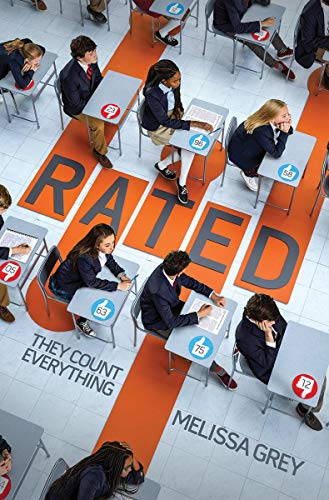Reviewed by Briana @ Pages Unbound on
Even though it’s been 11 years since the publication of the first Hunger Games book, avid YA readers might have mixed feelings about dystopian novels. Is it time for them to come back (like the vampire revival)? Or do dystopians still feel like “jumping on a fad?” Interestingly, Rated by Melissa Grey somewhat skirts the question. It’s a dystopian, presumably inspired by the Chinese social credit system that has been making headlines, but the focus in many ways is not actually on the world building; rather, the book shines through its characterization.
The book has six protagonists, six teenagers who attend the same elite prep school in a world where everyone has a rating. (If the book is jumping on a fad, perhaps it’s the multiple POV heist novel fad begun by Leigh Bardugo’s Six of Crows.) The point, of course, is that rating people is bad. It leads to anxiety over scoring the perfect rating. It leads to segregation in society, as some places like hospitals, grocery stores, etc. are only open to those with high ratings. It leads to corruption as people try to game the rating system. And, of course, the protagonists begin to realize there is something wrong with their world and start to come together to do something about it. That’s just how YA dystopian novels work.
Yet, even though technically the plot is focused on the dystopian element of the rating system and how to bring it down, that part of the novel always seemed to be in the background to me. This is partially because the world building is haphazard and under-developed. For instance, it’s impossible to say when the book takes place. One would guess decently into the future, based on the fact a lot of things have happened, from the implementation of the rating system itself to the banning of a number of classics, etc. That stuff takes time, particularly to be accepted as normal. However, one of the teen’s parents has videos of his own old high school games on VHS. That implies this book takes place about a decade into the future, max, which feels off to me.
The rating system itself is also not well-explained, a major whole in a book that takes the system as its premise. How the system actually works is revealed in bits and pieces, and I’m still not clear on it. What can you be rated for? Who can do the rating? (I thought only authority figures could rate for a long time, until it was revealed peer-to-peer rating is a thing, which is treated as “less than” a rating from a teacher, yet affects your rating in exactly the same way.) And if people you don’t know personally can rate you from seeing you online or watching you skate in a competition, why do the characters only experience rating drops of a point here and there? If 1000 people are watching you run an online video game, why would only two of them rate you? After reading the whole book, I still have a lot of questions.
To some extent, however, I found this did not really matter. The book’s true strength lies in the characters. Grey wonderfully balances her six POVs to create a varied cast of characters who each have their own private struggles and character arcs. Sure, the rating system is a problem, but I was much more invested in Noah’s family life and Hana’s figure skating career, and Bex’s quest to become valedictorian. The beauty of the book is in the individuals, not in the system they’re struggling against.
For the small dramas of each character and how they deal with them, I would recommend this book. I don’t think it excels as a dystopian because it didn’t really make me think. I didn’t get a sense this is a direction our world would actually go and, beyond the obvious, I didn’t get a sense of why readers should care. Sure, rating people is bad. I get that, but the book didn’t do anything interesting with that premise. I just liked the characters, and I think a lot of other readers will to, as long as they know to approach the book almost more as a contemporary about the ordinary struggles of high school students, rather than a dystopian novel.
****
Initial Thoughts: Interesting characterization. Less strong on the dystopian world building. It's intriguing, but there's nothing really memorable about the world building or the message, and this book is simply not going to have the impact of The Hunger Games, Uglies, Divergent, etc. Basically, it's a good read in the present, but I'm not going to remember that I read it a couple years from now. I also was not expecting this to end with the implication it might be a series.
Reading updates
- Started reading
- 17 June, 2019: Finished reading
- 17 June, 2019: Reviewed
